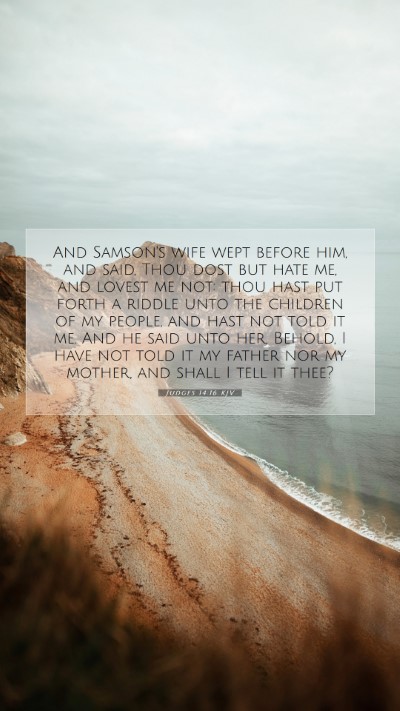Old Testament
Genesis Exodus Leviticus Numbers Deuteronomy Joshua Judges Ruth 1 Samuel 2 Samuel 1 Kings 2 Kings 1 Chronicles 2 Chronicles Ezra Nehemiah Esther Job Psalms Proverbs Ecclesiastes Song of Solomon Isaiah Jeremiah Lamentations Ezekiel Daniel Hosea Joel Amos Obadiah Jonah Micah Nahum Habakkuk Zephaniah Haggai Zechariah MalachiJudges 14:16 Meaning
What is the meaning of Judges 14:16?
And Samson's wife wept before him, and said, Thou dost but hate me, and lovest me not: thou hast put forth a riddle unto the children of my people, and hast not told it me. And he said unto her, Behold, I have not told it my father nor my mother, and shall I tell it thee?
Judges 14:16 Bible Verse Meaning
Bible Verse Commentary: Judges 14:16
Judges 14:16 (KJV): "And Samson's wife wept before him, and said, Thou dost but hate me, and lovest me not: thou hast put forth a riddle unto the children of my people, and hast not told it me. And he said unto her, Behold, I have not told it my father nor my mother, and shall I tell it thee?"
Understanding Scripture: Overview of Judges 14:16
This verse emerges from the narrative of Samson, a prominent judge of Israel, illustrating the personal struggles within his marriage and the emotional turmoil he faced from his wife. Judges 14:16 encompasses themes of love, secrecy, and relational dynamics, rich for exploration in the context of Bible study lessons and scripture analysis.
Insights from Public Domain Commentaries
-
Matthew Henry's Commentary
Matthew Henry emphasizes the emotional gravity of Samson’s wife's appeal, showcasing her vulnerability and sense of betrayal. Her statement reflects a common human desire for openness and trust in relationships. Henry notes that this interplay underscores the tensions between personal affection and public loyalty, highlighting the struggle of balancing one’s public persona with intimate relationships.
-
Albert Barnes' Notes
Albert Barnes interprets the riddle that Samson proposed as not merely a playful challenge but a reflection of his complex character and the societal pressures he faced. The lament of his wife reveals her feelings of exclusion and confusion. Barnes suggests that this moment serves as a teaching point about the importance of communication in relationships, drawing out the significance of understanding each other’s feelings and the impact of secrecy.
-
Adam Clarke’s Commentary
Adam Clarke provides a detailed exegesis on this passage, noting the cultural context of marital expectations during the time of the Judges. He explores the implications of Samson’s refusal to disclose the riddle to his wife, stressing the overarching themes of isolation and misunderstanding in their relationship. Clarke also points to broader reflections on the nature of love and commitment encapsulated in her accusations.
Key Themes in Judges 14:16
- Emotional Vulnerability: The reaction of Samson's wife showcases the sensitivity involved in intimate relationships.
- The Challenge of Secrecy: Samson's reluctance to share his riddle illustrates the complexities of trust in relationships.
- Public vs. Private Life: Samson's role as a judge and his personal challenges highlight the strikes between duty and personal matters.
Related Bible Cross References
- Proverbs 20:5: "Counsel in the heart of man is like deep water; but a man of understanding will draw it out." - Understanding the importance of communication.
- 1 Corinthians 13:4-7: "Charity suffereth long, and is kind; charity envieth not; charity vaunteth not itself, is not puffed up..." - Discussing the qualities of true love, as a contrast to the dynamics presented in Judges 14:16.
- Mark 10:9: "What therefore God hath joined together, let not man put asunder." - The significance of marital fidelity and commitment.
Application of Bible Verse: Insights for Daily Life
This verse prompts readers to reflect on the importance of transparency and open communication in relationships. Understanding the feelings of others and fostering trust can significantly enhance personal connections. This narrative invites participation in Bible study groups, providing an opportunity to delve deeper into the intricacies of interpersonal relationships as portrayed in scripture.
Conclusion
Judges 14:16 holds profound implications for understanding human emotions, strengthening the insight into interpersonal relationships within the biblical narrative. The commentaries from notable figures like Matthew Henry, Albert Barnes, and Adam Clarke collectively provide a rich foundation for Bible verse meanings and interpretations. Engaging with this verse through various Bible study tools and resources can enhance one's grasp of biblical teachings while promoting thoughtful reflections on the complexities of love and trust in human relationships.


